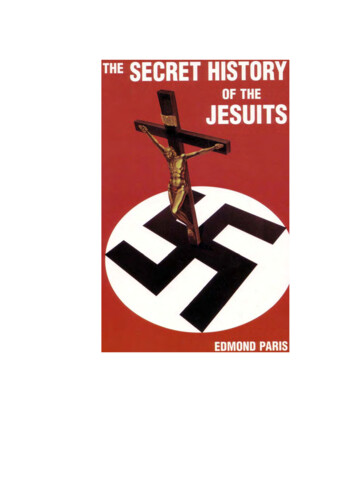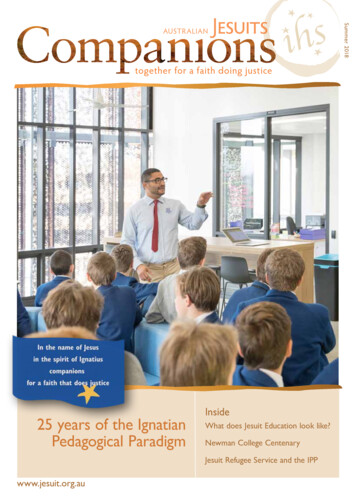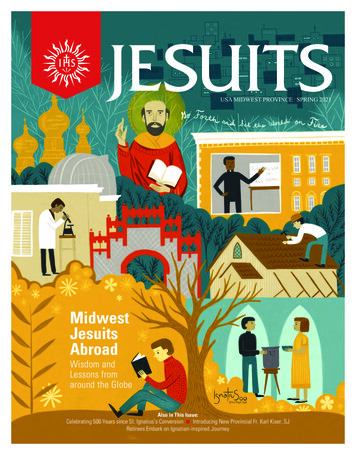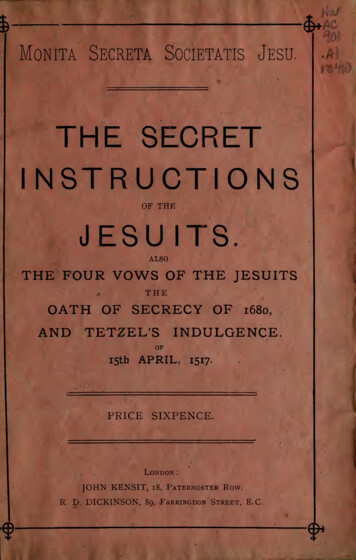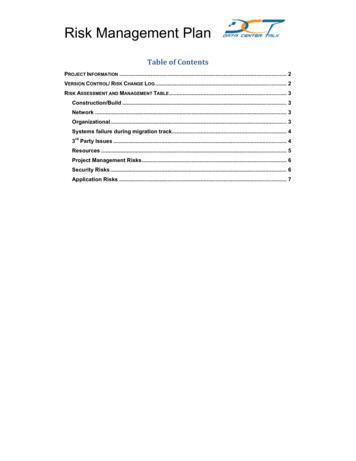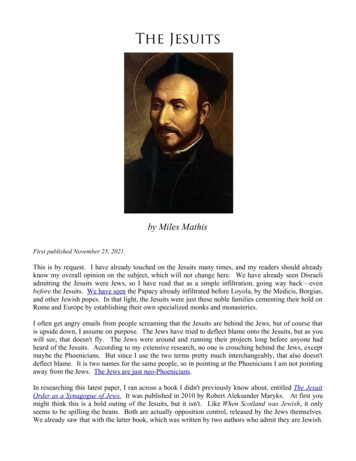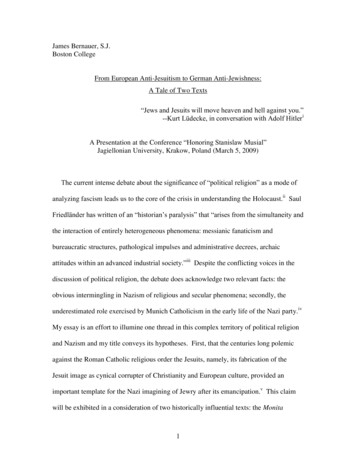
Transcription
James Bernauer, S.J.Boston CollegeFrom European Anti-Jesuitism to German Anti-Jewishness:A Tale of Two Texts“Jews and Jesuits will move heaven and hell against you.”--Kurt Lüdecke, in conversation with Adolf HitleriA Presentation at the Conference “Honoring Stanislaw Musial”Jagiellonian University, Krakow, Poland (March 5, 2009)The current intense debate about the significance of “political religion” as a mode ofanalyzing fascism leads us to the core of the crisis in understanding the Holocaust.ii SaulFriedländer has written of an “historian‟s paralysis” that “arises from the simultaneity andthe interaction of entirely heterogeneous phenomena: messianic fanaticism andbureaucratic structures, pathological impulses and administrative decrees, archaicattitudes within an advanced industrial society.”iii Despite the conflicting voices in thediscussion of political religion, the debate does acknowledge two relevant facts: theobvious intermingling in Nazism of religious and secular phenomena; secondly, theunderestimated role exercised by Munich Catholicism in the early life of the Nazi party. ivMy essay is an effort to illumine one thread in this complex territory of political religionand Nazism and my title conveys its hypotheses. First, that the centuries long polemicagainst the Roman Catholic religious order the Jesuits, namely, its fabrication of theJesuit image as cynical corrupter of Christianity and European culture, provided animportant template for the Nazi imagining of Jewry after its emancipation.v This claimwill be exhibited in a consideration of two historically influential texts: the Monita1
secreta which demonized the Jesuits and the Protocols of the Sages of Zion whichdiabolized the Jews.vi In the light of this examination, I shall claim that an intermingledrhetoric of Jesuit and Jewish wills to power operated in the imagination of some withinthe Nazi leadership, the most important of whom was Adolf Hitler himself.While often noticed, the similarity of the demonizations of Jesuit and Jew has rarelybeen rigorously analyzed. They were both the most frequent victims for those who soughta total, diabolical explanation for how history operated. They formed, as Lacouture hassaid, a “tragic couple.”vii Their diabolical character was charted on the axes of space andtime. Spatially, they operated outside of any specific territory and aspired for dominationover the world; they lurked behind thrones at the same time that they were quite willingto overthrow those very kings and nations. Jews and Jesuits were preeminently people ofthe city and, thus, were accused of being allied to wealth, loose morality, and a cunning,deracinated intelligence which was contemptuous of the traditions of the rural past.Temporally, they were at home in periods of decadence and collapse and, thus, they wereperceived as devotees of modernity: the same spectacles which detected the Jesuits asfathering the French revolution saw the Jews as the creators of the Russian one.viii Thefabrication of these images is indebted most to two texts.1)Monita secreta. The Private Directives of the Society of Jesus, the Monita secretaor, as the volume was also called, the Monita privata, was first published in 1615 inCracow, Poland. While it was published anonymously, its author was almost certainlythe Polish ex-Jesuit Jerome Zahorowski who had been expelled from the Order fordisciplinary issues in 1613. The Monita secreta reveals an unbridled will to power, theultimate aim of which is total “political governance.”ix The goal was to be achieved2
through close association with rulers and magnates who would be drawn to the Jesuitsbecause, in contrast to other religious, the claims of Christian conscience would bepresented as less demanding. Jesuits will become spiritual advisers to rulers in order to“infiltrate their mind” and to insert themselves into the most worldly of decisions whileappearing not to do so. As one instruction mandates: In recommending individuals to therulers for various positions “confessors and court preachers should say that they do notwish to interfere in any public administration. They should say they are speaking againsttheir will and only out of official duty.”xThe life-blood of this accumulating power is wealth and a frequent refrain of theMonita is the obligation to extract it. First from the powerful: “Our confessors of princesand magnates are to be frequently reminded that while they confer spiritual benefits, theyare not to be remiss in asking for material things to enhance the welfare of the Society.Therefore they are not to miss the opportunity to acquire something when it is offered.And if the gift is deferred, they should remind the noblemen without, however, showingtoo much avarice.”xi The Church‟s bishops should be manipulated in the campaign forpositions and riches: “We should praise their episcopal zeal and emphasize that theiraction will be remembered perpetually when our Society has taken such ecclesiasticalposts. In particular, the Society will easily obtain ecclesiastical benefices from thosebishops who are our penitents and slavishly depend on our direction and expect to bepromoted by us to richer and more important episcopacies.”xii Next in line as potentialbenefactors are widows who, along with their children, should be encouraged to enterreligious life so as to preclude any inheritance or a second marriage and, thus, the loss oftheir wealth: “The widows should have explained and shown to them what is lacking in3
our churches and the unfinished buildings of our colleges. They should be motivated tomake such outlays as will acquire perpetual praise. Examples would be the building ofchurches, dining halls and similar buildings which should be designedly made grandioseand magnificent. Thereby the widows have the opportunity to declare their generosity tothe world.”xiii Such women must be protected from worldliness, however. “If it happensthat the widows, who are inclined to piety and are very attached to the Society, areowners of a villa or two, they should be prompted to resign their goods to the Society,contenting themselves thereafter with an annual allowance from us in order that, freefrom temporal cares, they attend more easily to the service of God.”xiv Not to beoverlooked in the search for wealth are the members of the Society itself who shouldideally be recruited from the families of rich benefactors. “Kind treatment is also to beshown to those young men who have not yet signed over their property to the Society.After the renunciation, they should be fed with bread and no longer with milk.”xv Thegenerosity of its members, exhibited through this renunciation and their vows, does notwarrant commitment from the Order, however: “These vows do not constitute a mutualcontract as if the Society was perpetually obliged to keep persons with such vows. Thatwas never true, but the Society can dismiss when it pleases anyone for whatever reason,since the obligation [to remain a member] falls to the vower and not to the Society.”xviThe will to power is also a will to knowledge and the confessional becomes the keytechnology for the gathering of personal secrets and general information. Jesuits become“kings of knowledge” through their schools but also by way of their machinations.xviiKnowing the secrets of rulers and their ladies empowers Jesuits in their manipulation ofgovernment ministers and advisers. Of course, there is no regard for the sacramental4
secrecy of the confession itself. For example, carnal sins may yield important usablematerial: “If any confessor of ours hears in confession that any person of whatever sex has sinned carnally with some ecclesiastic, he should inquire if it is one of ours and whohe is by name. The confessor should not absolve the penitent if he does not first namethe accomplice outside of confession.”xviii This way of operating accurately reflects thecharacter of the Jesuit who is callous and a dissembler: “Our fathers should visit widowsoften, keeping them steadfast and paying their respect with pleasant and wittyconversation. In confession, they should not treat them severely unless there is no hopeof getting something out of them.”xix The creation of such wills to power and knowledgeis a disciplined, policed community at the center of which is the hidden but effectiveauthority of the Jesuit Order.2)The Protocols. The Protocols of the Sages of Zion has had many editions and,therefore, several editors but the consensus of scholarly opinion had been that it wascomposed in Paris around 1897-1899 by foreign agents working for the Russian secretpolice (Okhrana) under the direction of its leader Pyotr Ivanovich Rachkovsky. Anabbreviated form was first published in a Russian language newspaper in 1903 but thelonger version, the one that most subsequent editions follow, was published by SergeiiNilus in 1904 and his name is frequently given as its author.xx That consensus hasrecently been challenged and the argument has been made that the Protocols werecomposed in Russian and that country provides their explanatory context.xxi Mirroringthat disagreement, there is scholarly controversy with regard to the objectives itscomposition was meant to serve. Many are of the opinion that the text provided onemore weapon in the anti-Semitic arsenal of tsarist Russia. For others there is no5
convincing evidence that the governments of the last two Czars ever distributed the workor otherwise used it. Although The Protocols might have remained the “obsession ofreactionary imaginations, unknown to the world at large,” it was the Russian Revolutionand the development of a new myth of “Judeo-Bolshevism” that rescued the work “fromobscurity and has proved the most effective basis for its spread and its credibility.”xxiiThe Protocols are an account of conspiratorial discussions among Jewish leaders andreveal their will to power and their goal of establishing a world government that issubservient to them. They speak openly of their methods which are guided by the law thatthe “political has nothing in common with the moral.” As they say: “And the weapons inour hands are limitless ambitions, burning greediness, merciless vengeance, hatreds andmalice.”xxiii The leaders acknowledge their responsibility for creating the FrenchRevolution which was merely a step toward the world domination to which they aspire:the achievement of an “international power of a nature that by its position will enable uswithout any violence gradually to absorb all the State forces of the world and to form aSuper Government.”xxiv The leaders have contempt for non-Jews whose mind is“underdeveloped in comparison with our mind” and who are called to “blind obedience.”“The goyim are a flock of sheep, and we are their wolves. And you know what happenswhen the wolves get hold of the flock?”xxv Still, non-Jews are needed to carry out thedirectives of the Jewish elders. “The administrators whom we shall choose from amongthe public, with strict regard for their capacities for servile obedience, will not be personstrained in the arts of government, and will therefore easily become pawns in our game inthe hands of men of learning and genius who will be their advisers, specialists bred andreared from early childhood to rule the affairs of the whole world.”xxvi6
As was the case with the Monita secreta, wealth is the life blood of the conspiracy.“In our hands is the greatest power of our day—gold: in two days we can procure fromour storehouses any quantity we may please.” The objective of the elders is precise: “Onthe ruins of the natural and genealogical aristocracy of the goyim we have set up thearistocracy of our educated class headed by the aristocracy of money.”xxvii Along withmoney, secrecy and the Press are essential tools for domination and the Press “with a fewexceptions that may be disregarded, is already entirely in our hands.” The newspapermilitia will be “like the Indian idol Vishnu” and will have a “hundred hands”: “Thosefools who will think they are repeating the opinion of a newspaper of their own camp willbe repeating our opinion or any opinion that seems desirable for us.”xxviii As with theJesuit plots, the Jewish will to power is allied with a very modern will to knowledge.The elders will surround themselves with other Jewish leaders, “with persons prepared bya special super-educational training in our special schools. These persons will havecognizance of all the secrets of the social structure, they will know all the languages thatcan be made up by political alphabets and words; they will be made acquainted with thewhole underside of human nature, with all its sensitive cords on which they will have toplay.”xxix These educated radicals will spread resentment throughout society: “Then willthe hour strike when, not for the sake of attaining the good, not even to win wealth, butsolely out of hatred towards the privileged, the lower classes of the goyim will follow ourlead against our rivals for power, the intellectuals of the goyim.”xxxThe fruit of this struggle will be a government that, while having the “appearance of apatriarchial paternal guardianship,” will be totalitarian: “In our programme one-third ofour subjects will keep the rest under observation from a sense of duty, on the principle of7
volunteer service to the State. It will then be no disgrace to be a spy and informer, but amerit”. No challenge to the new order of governance will be tolerated: “we shall slaywithout mercy all who take arms in hand to oppose our coming into our kingdom.”xxxi Aswas the achievement in the Monita secreta, these wills to power and knowledge create ashrine of authority that is “glorious” because it is “all-powerful.” “Our authority will bethe crown of order, and in that is included the whole happiness of man. The aureole ofthis authority will inspire a mystical bowing of the knee before it and a reverent fearbefore it of all the peoples.”xxxii The elders of Zion do acknowledge, however, that therewas one foe who compared with their ambitions and talents: “Reared on analysis,observation, on delicacies of fine calculation, in this species of skill, we have no rivals,any more than we have either in the drawing up of plans of political actions andsolidarity. In this respect the Jesuits alone might have compared with us, but we havecontrived to discredit them in the eyes of the unthinking mob as an overt organization,while we ourselves all the while have kept our secret organization in the shade.”xxxiii3)„Monita‟ and „Protocols‟. Quite apart from this explicit mention of the Jesuit, thereis an obvious correspondence in the representations of the Jesuit and Jew in these twodocuments . Recent scholarship has deepened the appreciation of that similarity and hasattempted to trace the twisted paths along which the early seventeenth-century Monitacontributed to the categories of the late nineteenth century Protocols. The emphasis hasbeen on understanding the French milieu in which the latter was composed and wherethere had long been an anti-Jesuit discourse.xxxiv Although major French intellectualssuch as Michelet and Quinet helped to fashion the image of the diabolical Jesuit, it wasthe novelist Eugène Sue who popularized the figure in several enormously successful8
serialized works: The Wandering Jew (1844-45) and The Mysteries of the People (18491857). In them the plot for Jesuit domination of the world is put forward in careful detailand the Jesuit type is put under a microscope:It is a curious sight to view from on high the regular play of thousands of menwhose personalities are continually absorbed into the immutable character of ourorder. ( ) We possess that power. Truly, I am always struck by an almostfrightening admiration, while musing that before joining us there was a man whothought, saw, believed and acted as he wished ( ), and when he has been with usfor a few months, there is nothing of the man left other than a shell. Intelligence,spirit, reason, conscience, free will are all paralyzed in him. He is dried up,atrophied by the habit of a mute, terrible obedience. He has engaged in mysteriousexercises that shatter and kill all that is free and spontaneous in human thought.Then into these bodies that are deprived of soul, that are mute, cheerless, cold, webreathed in the spirit of our order. Immediately bodies march, see act,mechanically execute commands, but they are ignorant of any plans. They are likea hand that accomplishes the most difficult of tasks without grasping the thought ofthe one directing it.xxxvThe second major French source is the political pamphlet written by Maurice Joly andpublished in 1864: The Dialogue in Hell Between Machiavelli and Montesquieu.xxxviTheir conversation is a disguised attack on the dictatorial rule of Napoleon III and thevolume was quickly confiscated by the French and its author sentenced to jail. Thejudgment of the court pointed out that the dialogue “established a general thesis that thedreadful despotism taught by Machiavelli in his treatise, The Prince, has succeeded, byartifice and evil ways, in imposing itself on modern society .The author charges theFrench government with having, through shameful means, hypocritical ways, andperfidious contrivances led the public astray, degraded the character of the nation, andcorrupted its morals.”xxxvii Its close relationship to the Protocols was first noticed by acorrespondent for the Times of London, Philipp Graves, who discovered a copy bychance in 1921 in Istanbul. Norman Cohn has pointed out how the forger of theProtocols plagiarized two-fifths of his entire text from Joly and even its arrangement was9
imitated with the “twenty-four chapters of the Protocols corresponding roughly with thetwenty-five of the Dialogue.”xxxviii The themes for the discussion come out of the popularanti-Jesuit and anti-Jewish rhetorics of nineteenth century France. Machiavelli articulatesthe commonly charged Jesuit moral position on the relationship of ends to means: “Whatemerges from these considerations is that good can come from evil; that one attains goodthrough evil, just as someone is cured by poison, or someone‟s life is saved by the cut ofa knife. Everything is good or bad according to the use made of it and the advantagederived from it.”xxxixAnother important twist in the road to the Protocols was provided by a chapter in anovel by a German, Hermann Goedsche, who published Biarritz in 1868 under thepseudonym of Sir John Retcliffe. The chapter was entitled “In the Jewish Cemetery inPrague” and told the story of how leaders from each of the twelve Jewish tribes cametogether to plot the conquest of the world. They worship gold and imagine control of themedia through it: “Our possession of gold, our skill in devising means of exploitingmercenary instincts, will make us the arbiters of public opinion and enable us to dominatethe masses.” The sexual motif, that will become a specific staple of German antiSemitism, is also voiced in this meeting: “It is desirable that Jews should refrain fromtaking women of our holy religion as their mistresses and that they should chooseChristian virgins for that role.”xlIn recent years scholars have complemented the earlier emphasis on the French role inthe evolution of the Protocols with a new regard for the Russian milieu in which it wasfirst published. For example, Cesare De Michelis has argued persuasively that theconstruction of the diabolical Jesuit who was ancestor to the Jew of the Protocols owes10
less to the writings of Sue than it does to the “perverse image of Jesuitism” thatflourished in nineteenth and twentieth century Russia and that led to legal prohibition ofentry into Russia for Jesuits.xli That image, he claims, would have been far moreinfluential on the Russian authors of the original version of the Protocols.4)Meeting Hitler. There is the occasional testimony to how this linked anti-Jewish,anti-Jesuit discourse found political voice in Nazi thought and practice. For example,Eichmann‟s deputy, Dieter Wisliceny, who was executed in 1948 for his owninvolvement, described the two ideas which led Hitler and Himmler to the mass murderof Jews: one was a biological racism; the other was a “mystical and religious view whichsees the world as ruled by good and bad powers. According to this view the Jewsrepresented the evil principle, with, as auxiliaries, the Church (the Jesuit Order),Freemasonary and Bolshevism.”xlii There are several major streams which carried theinterrelated visions of anti-Jesuit and anti-Semite to Hitler himself. Houston StewartChamberlain‟s Foundations of the Nineteenth Century celebrated the prowess of theAryan people in its struggle with other races and his volume was very popular in Nazicircles and Hitler himself acknowledges Chamberlain‟s stature in his Mein Kampf.xliiiChamberlain‟s hope for Aryan supremacy explicitly entailed a life and death conflict withJewish and Jesuit cultures. For him, Ignatius of Loyola, allied with the Jews who madeup his circle of friends, embodied the “struggle against the Germanic spirit.” The Jesuitethos put forward an “absolute materialism” that both opposed the mystical, spiritualquality of an Aryan Christianity and subverted its love for freedom. xliv Another sourcefor Hitler would have been his one time ally, General Erich Ludendorff, who publishedseveral works that yoked Jesuit and Jew together in a general conspiracy against German11
moral life and in the particular responsibility for the “stab in the back” on the homefrontthat brought defeat to Germany in World War I.xlv A third more significant source isrepresented by Dietrich Eckart who has been regarded as a mentor for Hitler and towhom Hitler paid tribute at the very end of Mein Kampf as that “man, one of the best,who devoted his life to the awakening of his, our people, in his writings and his thoughtsand finally in his deeds”.xlvi Among those writings is a dialogue between him and Hitlerthat was published in 1924 as Bolshevism from Moses to Lenin and which Ernst Nolte hascalled the “most authentic and revealing of all conversations with Hitler.”xlvii As the titleindicates, the speakers assert that Bolshevism was invented by the Jewish spirit from itsvery beginnings in Moses. There is much discussion of religion, of Judaism, of theCatholic Church as well as of the Reformation in the text. Eckart also speaks of theJesuits and ties them to the Jews in terms of both personalities and spirit. “The moraltheology of the Jesuits is similarly execrable as the moral teaching of the Talmud.”xlviiiThe key figure in the interrelating of Jew and Jesuit for Hitler, however, is most likelyAlfred Rosenberg (1893-1946) who came to be the Nazi Party‟s leading ideologist wellbefore he was appointed in 1934 as the “Führer‟s delegate for the supervision of thewhole intellectual and philosophical education and training of the National SocialistParty.”xlix Born in Estonia into a family of Baltic Germans, he fled the CommunistRevolution in 1918 and, along with other fiercely anti-Communist Russian émigrés,Rosenberg arrived in Munich at the beginning of 1919. It was in Munich where he metHitler‟s associate, Dietrich Eckart, who quickly employed him as a writer for thenewspaper he edited, In Good German (Auf Gut Deutsch). Rosenberg immediatelystarting writing up the anti-Semitic views he had brought from Russia and central to12
which were convictions regarding Jews‟ aspiration for total power, their destructivematerialism, and their responsibility for the Russian Revolution.l It was also in Munichthat Rosenberg encountered the influence of Bavarian Catholicism which he probablyviewed through the lens of the anti-Catholicism and anti-Jesuitism of his native Russia.liIn any case, he was appalled by the power exercised by Catholic culture and saw thematerialism of the Jesuit at the center of its corruption of spiritual power. In 1920,Rosenberg published his The Trace of the Jew through Changing Times which crudelyarticulated the fundamentals of his anti-Semitism. In the same year he published a seriesof articles on Jesuitism where he examined its embodiment of Judaism.lii A year later hewould put Jesuits and Jews together as criminal aspirants to world domination.liiiRosenberg met Hitler in 1919 and he quickly became one of his followers for whichhe was rewarded with important posts that included chief editor of the party newspaper(Völkischer Beobachter) and later Reich Minister for the Occupied Eastern Territories.Despite these positions, there has been a tendency to underestimate Rosenberg‟simportance to Hitler and the Nazi movement because he does not seem to have been aninfluential force in Hitler‟s major decisions.liv Today, as greater respect for the place ofideology in Nazism has grown, there is new regard for Rosenberg‟s importance as thearchitect of the National Socialist worldview.lv Hitler decided to make him the firstrecipient in 1937 of the National Prize for Art and Science and its citation asserted thatRosenberg had distinguished himself “because he helped establish and stabilize the worldview of National Socialism both scientifically and intuitively.” There is also the 1943personal letter from Hitler in which he wrote: “I still remember the day I met you in thehome of Dietrich Eckart. Since then you have become the first spiritual and intellectual13
co-builder of the party.”lvi Although Hitler‟s biographer, Konrad Heiden claimed thatRosenberg was the first to give Hitler a copy of the Protocols, it seems that Eckart wasmore likely to have introduced Hitler to its ideas and the first indication of Hitler‟sembrace of those ideas is in his notes for an August 1921 speech.lvii We do know,however, that Hitler also adopted Rosenberg‟s view of the collusion between Jewishleadership and the creation of the Russian Revolution. We may surmise that Hitler‟s ownanti-Jesuitism would have welcomed Rosenberg‟s presentation of the parallel betweenJews and Jesuits.For Rosenberg, the Jesuit founder “Ignatius Loyola formed a type. He consciouslytrod under foot men‟s feelings of honor, set a new goal for ideas, revealed exact meansand ways and was thus a conscious cultivator of souls.”lviii Its “corpse-like obedience”has created a “herd of soulless slaves.” And for what purpose? Its goal, “Ad majoremdei gloriam” (“For the greater glory of God”) has become the “disintegration of theNordic-Germanic West,” and the Order has “wormed its way in everywhere that a woundbecame noticeable in the body of a people.”lix The Order also possesses a will toknowledge that solidified itself in working toward, as it in fact did, the definition ofPapal infallibility at the First Vatican Council. In having this doctrine solemnly declared“Jesuitism has drawn the last logical conclusions from the Roman system” and the“Roman-Jesuitical systematic destruction of personality was perfected.”lx Jesuits andJews have dreamed what can only seem a nightmare for spiritual peoples: “We know ofthe monstrously strong evil dream of Ignatius Loyola whose soul-destroying breath lieseven today over our entire culture.” “On Mount Zion a dream was cultivated forcenturies, the dream of gold, of power of lies and hatred. This dream drove the Jews14
around the entire world, a restless, strong dream Abandoning love, beauty, honor, theJew dreamed only of the loveless, the ugly and the honorless. The Jew soughtdomination and, until 1933, seemed stronger than us.”lxiConclusion. We know from his customary rhetoric that Hitler accepted the validity ofthe Protocols. As he writes in Mein Kampf:To what an extent the whole existence of this people is based on acontinuous lie is shown incomparably by the Protocols of the Wise Men ofZion, so infinitely hated by the Jews. They are based on a forgery, theFrankfurter Zeitung moans and screams once every week: the best proofthat they are authentic. What many Jews may do unconsciously is hereconsciously exposed .Anyone who examines the historical developmentof the last hundred years from the standpoint of this book will at onceunderstand the screaming of the Jewish press. For once this book hasbecome the common property of a people, the Jewish menace may beconsidered as broken.lxiiWe may even wonder whether the Protocols was the key text for the development ofHitler‟s worldview and personal strategy. His early biographer Konrad Heiden hadsuggested this perspective. Even if it was a forgery, Heiden pointed out, the Protocolsnevertheless provided a “textbook of world domination, pure and simple.” “At first he[Hitler] sincerely believed that The Protocols of the Wise Men of Zion were theinstructions for establishing Jewish world domination. Later when time came for him toformulate his own aims, he was forced to recognize that they were laid down in thissupposed Jewish book.”lxiiiTo my knowledge, there is no comparable reference to the Monita secreta in Hitler‟swritings and speeches but that work‟s image of Jesuit ambition and corruption was verylikely in Hitler‟s mind well before he developed his passionate hatred of the Jews. Whenhe lived in Vienna before World War I, it is reported that the two groups he haranguedthe most were the Communists and the Jesuits, not the Jews.lxiv This animosity toward15
the Jesuits likely goes as far back as his adolescent years in Linz, Austria, where therewas especially strong support for German nationalism. Hitler was certainly drawn as ayouth to the nationalist anti-Hapsburg movement led by George Ritter von Schönerer.His “away from Rome” movement was a summons to replace the international RomanCatholic allegiance promoted by and the Jesuits with an authentic Germanic spirituality.To quote Schönerer: “So, away with those fetters that bind us to a Church inimical toGermany. Not a Jesuit but a Germanic spirit shall rule and govern in German lands.”lxvHitler‟s ow
2 secreta which demonized the Jesuits and the Protocols of the Sages of Zion which diabolized the Jews.vi In the light of this examination, I shall claim that an intermingled rhetoric of Jesuit and Jewish wills to power operated in the imagination of some within the Nazi leadership, the most important of whom was Adolf Hitler himself.
